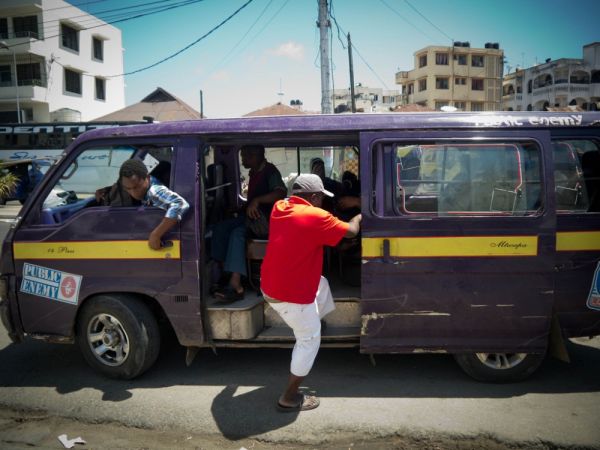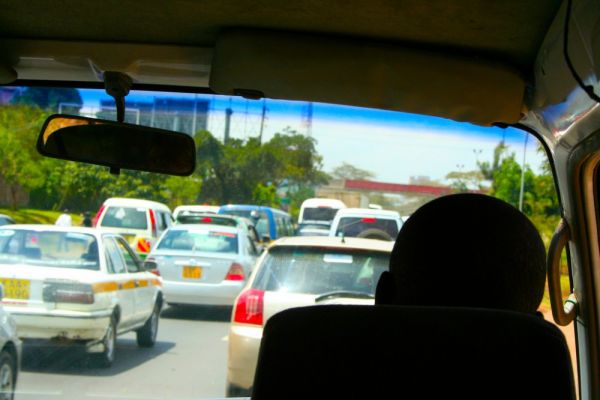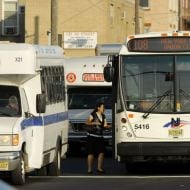With an Iron Fist, Authorities Try to Rein In Kenya’s Lawless Streets

Nairobi’s private bus system is chaotic, cheap and unregulated. Photo credit: Jennifer Wu via Flickr Creative Commons
The large green-and-yellow Citi Hoppa bus crawled forward in tiny increments, stuck in the logjam that clogs Nairobi’s Argwings Kodhek Road during every evening rush. At a certain point, however, the driver could take no more, and suddenly the bus and its forty passengers were up on the adjacent sidewalk, sending pedestrians scrambling into the street. After cutting the line by a few car-lengths, the driver took advantage of an opening in the traffic and casually steered the bus back onto the thoroughfare, a minute or two shaved off of our travel time.
This is not a unique experience for a regular rider of the informal public transportation system that shuttles people around Kenya’s fast-growing capital. Mass-transit users in this city rely on an ad-hoc, unregulated fleet of privately owned buses and minivans called matatus, commonly referred to as Public Service Vehicles (PSVs). “It [the transportation sector] relies on the private sector” in Nairobi, says Simon Kimutai, chairman of the Matatu Owners Association (MOA). But the system — if one can call it that — is at a crossroads. New laws issued in November indicate that the Kenyan government is trying to exert greater control over Nairobi’s transportation, a tricky endeavor it’s failed at before. Dominated by private bus owners since the 1970s, the city’s unwieldy and tempestuous transit system won’t be easily reigned in, and not everyone is convinced that the government should even try.
Of greatest concern are the historical failures that have resulted from official intervention in Kenyan transit. The mid 1980s saw the launch of the government-run Nyayo Bus Services, supported not only by significant subsidies, but also with the direct aid of European allies. The public bus line, however, went belly-up in a mere nine years, unable to compete due to the reliable and ruthless PSVs.
A matatu ride into Nairobi — note the presence of pedestrians walking freely though swift-moving traffic. Video by rccook1 via YouTube
Similarly, 2005 witnessed the collapse of the Kenya Bus Service (KBS), a public transportation firm run and operated by Nairobi’s City Council. As with the collapse of Nyayo Bus Services, the government-run KBS simply couldn’t withstand the competition with Nairobi’s low-cost informal transportation sector. (Ironically, KBS switched to a privately run PSV model following its demise, and is now operating as one of Nairobi’s strongest transportation entities).
Given the historical inability of Nairobi bureaucrats to successfully provide transportation to the city’s population, it’s no surprise that citizens are wary of the government creeping back into the bus business.
“I won’t have a job if the government intervenes,” says Moses Machira, a worker for Nairobi-based StarBus, one of the many PSVs currently operating in the city. Mr. Machira, who resides in Kangemi, one of Nairobi’s largest slums, argues that the government has a tendency to “eat the businesses” it intervenes in. His latest frustration with government regulation? The 2012 Traffic Amendment Bill passed by the Kenyan Parliament last month, which never sought consultation with transportation providers while they were drafting it.
According to Mr. Machira and other workers in the transportation sector, the Traffic Bill has the potential to render it virtually impossible for average Kenyans to operate their own buses. The typical worker in Nairobi’s informal transportation sector makes roughly 15,000 Kenyan shillings per month – about $175 USD. The new 20,000-shilling speeding fine that was enacted through this legislation, however, would have the potential to single-handedly decimate the livelihood of a matatu or bus operator.

The Kenyan government hopes to tame its country’s wild traffic with strict new laws. Photo credit: Linh Do
Berel Williams, a civil society worker in Nairobi, condoned the government’s efforts to further formalize the PSV sector. While recognizing that road-safety is a “major issue facing the city,” she was quick to point out that increasing government oversight has resulted in her daily bus and matatu fare increasing by twenty shillings per ride, pinning her with an unexpected tax of about $3 USD each week.
The historically low price of transportation throughout Nairobi is largely a result of the system’s informality, which allows for large numbers of PSVs, significant competition, low start-up costs and the ability to negotiate the price of your ride. One could argue that these low fares have benefited Nairobi’s impoverished populations especially. Therefore, even an incremental price increase, like the one being felt by Ms. Williams, will have a significant impact in a city like Nairobi, where over half the population lives in informal settlements.
On the other hand, these new laws could strike the right balance between the efficiency of micro-enterprises and the benefits governmental oversight. Reports indicate that over 3,000 Kenyans die each year in road accidents. Even Mr. Kimutai admits that “there should be some sanity in the industry,” such as rules keeping vehicles off the sidewalks, banning drunk drivers, and ensuring that PSV operators obey speed limits.
But finding a working compromise will be an ongoing challenge for an industry that has gotten very comfortable playing by its own rules. While the Kenyan government has largely failed to get Nairobi’s residents to and from work, PSV drivers have been accomplishing this task for over three decades. Perhaps it’s time for a middle-of-the-road solution.









